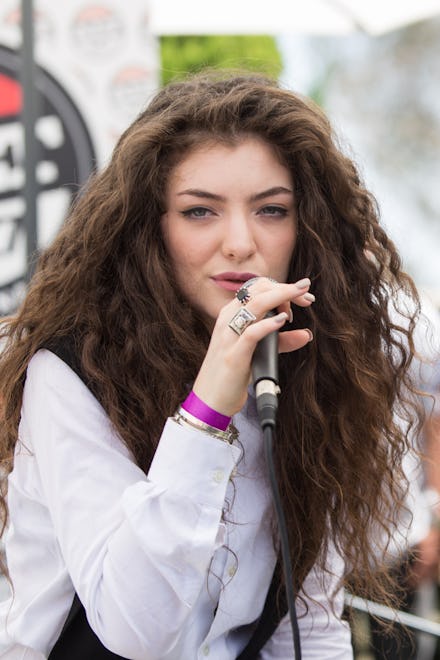Lorde Is Proof That Women Don't Need to Sell Sex to Sell Records

In an interview this past weekend with NPR's Scott Simon, pop icon Katy Perry bemoaned the current state of nakedness among female pop stars. This came a little over a week after actress Rashida Jones tweeted her frustration with the popularity of female celebrities who don next-to-nothing outfits. Throw in the Miley Cyrus media circus and Sinead O'Connor's open letter to Cyrus urging her to understand she's "worth more" than her body or sex appeal, and it would seem pop culture has reached a point at which the path of "sex sells" has become the only means to fame (or notoriety) for women. However, when you take a look at what's actually selling vs. the hyped, often hypocritical, lamentations being tossed around, the disparity suggests something else. You can see what actually sells in in the rising popularity of female artist, Lorde.
Ella Yelich-O'Connor, aka Lorde, is the 16-year-old New Zealand singer-songwriter whose hit single, "Royals," off her debut album Pure Heroine, has topped the Billboard Hot 100 for four weeks, the longest lead for a female artist this year. It's currently beating out both Perry's "Roar" and Cyrus' "Wrecking Ball" (at Nos. 2 and 3, respectively). Lorde's song, which critiques the unrelatable opulence of the consumerist lifestyle portrayed by many musicians, passed the three-week domination of Pink's "Just Give Me a Reason" in April/May; no song by a female has topped the 100 longer since Carly Rae Jepsen's "Call Me Maybe" last year, which sat for nine weeks at No. 1. "Royals" — which has sold 2.5 million downloads, according to Nielsen SoundScan — has topped most of the Billboard airplay charts, including Pop Songs, Radio Songs, Hot Rock Songs, and Alternative Songs — on which it sat for seven weeks, passing Alanis Morissette's "You Oughta Know" and earning the longest reign by a lead female in the list's 25-year history.
Lorde is the youngest solo artist to debut at No. 1 on the U.K. singles chart since 1998, and just hit No. 1 on Top Songs in the iTunes Store, again beating out Perry and Cyrus on both fronts. Pure Heroine took the No. 3 spot in Top Albums. The album also had nearly 6 million U.S. plays on online streaming platform Spotify in its first week and opened on the Billboard 200 at No. 3, selling 129,000 copies — not quite as many as her two main contenders (Cyrus' Bangerz debuted at No. 1 on the Billboard 200 and earned the year's largest sales week for a solo woman, and Perry's Prism is expected to debut at No. 1 and sell close to 300,000 copies), but still excellent for a newcomer. Its first week on sale in New Zealand, Pure Heroine reached No. 1 and went platinum. "Royals" dominated the charts in her home country for months before Lorde, who signed a development deal with Universal Records when she was just 12, exploded onto the international scene.
These numbers are an important indicator of either a shift in what music fans want or a need that's always been there: for an artist whose visual presentation and sexuality are not the main focus of her brand.
Perry, whose Prism is her second record to hit No. 1 on the U.K. Albums charts, told NPR's Simon, "[F]emales in pop — everybody's getting naked. I mean, I've been naked before but I don't feel like I have to always get naked to be noticed .… I'm not talking about anyone in particular. I'm talking about all of them. I mean, it's like everybody's so naked. It's like put it away. We know you've got it. I got it too." It's a somewhat hypocritical statement for Perry, who despite vaguely acknowledging her role in this trend, is arguably most famous for her cheeky and brazen use of sexual innuendos, both lyrically and in her onstage costumes. "I've taken it off for — I've taken it out here and there. And I'm not necessarily judging. I'm just saying sometimes it's nice to play that card but also it's nice to play other cards. And I know I have that sexy card in my deck but I don't always have to use that card."
Image via Perez Hilton .
Jones, of Emmy-nominated TV show Parks and Recreation, posted to Twitter, "This week's celeb news takeaway: she who comes closest to showing the actual inside of her vagina is most popular. #stopactinglikewhores," later clarifying that she doesn't shame anyone for what they choose to do with their lives or bodies, but that we should all "take a look at what we are accepting as 'the norm.'"
Sinead O'Connor, sparked by Cyrus' statement that her video for "Wrecking Ball" was inspired by the one for the Irish singer's "Nothing Compares 2 U," wrote an open plea to the pop star for her not to exploit her sexuality or let the music business "make a prostitute" of her.
Women are, of course, free to choose whether to use their sexuality as part of their image or brand, but so much of our pop-culture talk focuses on those who do when, in fact, artists like Lorde — and the audiences who listen to her — are asking us to shift our focus. While the women she's vying with for popularity have tended to use their sexuality to sell their music, Lorde is proving fierce competition with her obvious lack of interest in representing herself the same way, and she's resonating with a wide range of demographics for a reason. It's still a nascent fight, but she's challenging the widely-held idea that sex alone sells through her image, songs, and lyrics. She is showing the music industry (and the pop-culture community at large) that taking anything off isn't a requisite for grabbing people's attention.